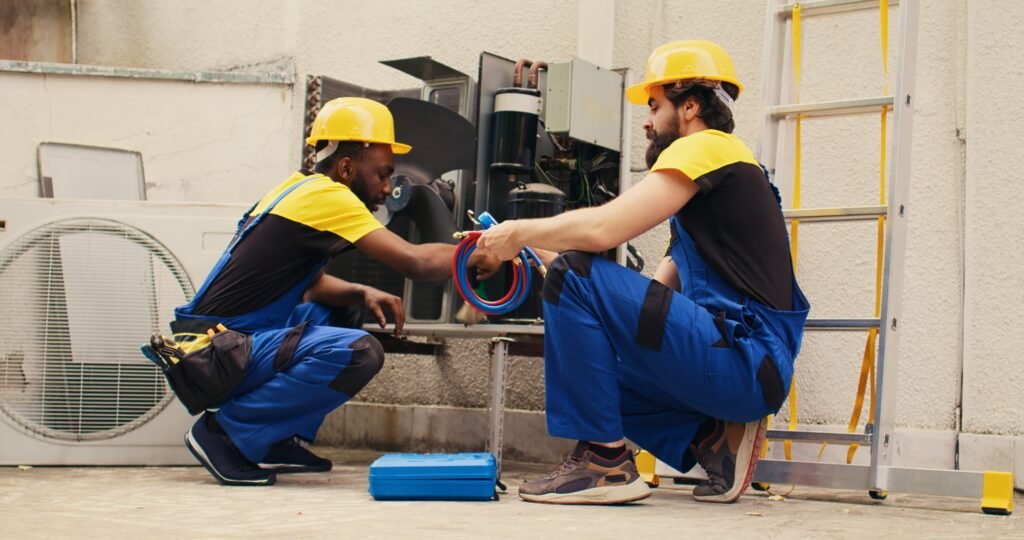At some point, every homeowner faces a big question: Should I repair my air conditioner or replace it entirely?
It’s not an easy decision. Repairs are often cheaper in the short term, but sometimes they only delay the inevitable. On the other hand, replacing your AC requires a bigger investment upfront but can save money and headaches down the road.
If you’re stuck wondering which way to go, this guide will break down the key factors that help determine whether AC repair or replacement is the smarter move.
Why This Question Matters
Your air conditioner isn’t just about comfort, it affects your monthly bills, your indoor air quality, and even the value of your home. Choosing repair vs. replacement at the right time can:
- Save you hundreds (or thousands) in repair costs.
- Lower your energy bills.
- Keep your home consistently cool.
- Prevent surprise breakdowns in the middle of summer.
Let’s go step by step to figure out which option makes sense for you.
When Repair Is the Smarter Choice
There are plenty of situations where a simple repair makes the most sense:
1. Your AC Is Still Relatively New
Most air conditioners last 12–15 years on average. If your system is less than 8–10 years old, it still has a lot of life left in it. In this case, repairing a minor issue (like a capacitor, thermostat, or drain line) is usually worth it.
2. The Repair Cost Is Small
If your repair is minor, under a few hundred dollars, repairing usually makes more sense than replacing. For example, replacing a contactor, adding refrigerant, or fixing a clogged drain line are all simple, cost-effective fixes.
3. The System Is Running Efficiently
If your energy bills haven’t skyrocketed and your AC still cools your home evenly, a repair may be all you need.
Signs It’s Time to Replace Your AC
Sometimes, however, replacement is the more cost-effective choice. Watch out for these red flags:
1. Your AC Is Over 12–15 Years Old
Even with the best care, most systems begin to wear down around this age. Older units are less efficient, more prone to breakdowns, and often use outdated refrigerants.
2. Repairs Are Becoming Frequent
If you’ve had to call for AC service more than once or twice a season, those costs can add up quickly. At some point, you’re just throwing money at a failing system.
3. Your Energy Bills Are Rising
An air conditioner that runs longer and harder to cool your home is costing you money each month. A new high-efficiency unit can reduce energy use by 20–40%, which often pays for itself over time.
4. Major Components Are Failing
Big-ticket repairs like a compressor or evaporator coil can cost thousands of dollars. If your system is older, investing that money in a replacement is usually smarter than repairing.
5. Your AC Still Uses R-22 Refrigerant
If your system uses R-22 (Freon), repairs can be especially costly since it’s been phased out. If you’re in this situation, replacement is almost always the better long-term option.
The 50% Rule (Quick Decision Tool)
Here’s a simple rule many HVAC professionals use:
If the repair cost is more than 50% of the cost of a new system and your AC is more than 10 years old, replacement is the better investment.
Benefits of Upgrading to a New System
If you decide replacement is the way to go, you’re not just avoiding repairs — you’re getting some solid benefits too.
Lower Energy Bills
New systems have much higher SEER ratings, meaning they use less energy to cool your home.
Consistent Comfort
Modern systems are better at maintaining steady temperatures and balanced airflow.
Quieter Operation
Today’s air conditioners are far quieter than older models.
Smart Technology
Many newer systems pair with smart thermostats and zoning controls for better comfort and energy savings.
Improved Indoor Air Quality
Advanced filtration and humidity control features can make a noticeable difference in your home’s air.
What If You’re Still Unsure?
If you’re stuck between repair and replacement, here are a few tips:
- Ask for a detailed estimate. Compare the cost of repair vs. the price of a new unit.
- Consider your long-term plans. If you’re selling your house soon, repairing may be fine. If you plan to stay, replacement could be better.
- Get a professional inspection. An HVAC technician can evaluate the condition of your system and give you honest advice.
How to Extend the Life of Your Current AC
If you choose to repair, make sure you’re also taking steps to get the most out of your system:
- Change air filters every 1–3 months.
- Keep the outdoor unit free of debris.
- Schedule annual tune-ups.
- Seal ductwork to prevent energy loss.
- Use a programmable or smart thermostat.
These simple steps can help stretch out your system’s lifespan and keep it running efficiently.
Final Thoughts
Deciding whether to repair or replace your air conditioner comes down to age, cost, efficiency, and how often you’re dealing with issues.
- If your system is newer, repairs are usually fine.
- If it’s older, costly, and inefficient, replacement is the smarter long-term choice.
Either way, don’t ignore the warning signs. Acting quickly can save you money and keep your home cool and comfortable.
If you’re unsure, schedule an inspection with our team. We’ll give you an honest, professional opinion and help you choose the best option for your home and budget.


